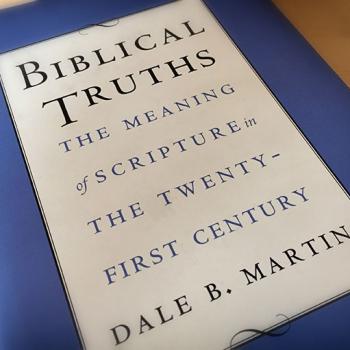
I’m a Christian because of Søren Kierkegaard. The 19th-century Danish philosopher didn’t introduce me to Christianity, but he did, at a pivotal time in my life, provide the crucial encouragement that sustained my faith.
During high school I began questioning virtually every aspect of Christianity. To my youthfully inquisitive mind, so much of religious belief seemed to rest on such shaky foundations and so much of what I had been taught about Christianity seemed fraught with irreconcilable difficulties.
In my search for answers I read widely in theology, philosophy and history. But more often than not, the sources that were supposed to provide answers and reassurances only led to more frustration. Works of Christian apologetics proved to be particularly disappointing: they had an answer for everything, but their “answers” usually seemed to be little more than elaborate exercises in obfuscation and self-assurance.
It was in the writings of Kierkegaard that I eventually found a way to move past trite answers and beyond paralyzing doubt. Kierkegaard’s ruminations on truth, faith and reason still resonate me with today:
Without risk, no faith. Faith is the contradiction between the infinite passion of inwardness and the objective uncertainty. If I am able to apprehend God objectively, I do not have faith; but because I cannot do this, I must have faith. If I want to keep myself in faith, I must continually see to it that I hold fast the objective uncertainty, see to it that in the objective uncertainty I am “out on 70,000 fathoms of water” and still have faith.
from Concluding Unscientific Postscript, p204.
 Given the crucial role that Kierkegaard played in my religious development, my interest was piqued by Merold Westphal’s recent book on the subject of Kierkegaard and faith, appropriately, if unimaginatively, titled Kierkegaard’s Concept of Faith, (Eerdmans, $35).
Given the crucial role that Kierkegaard played in my religious development, my interest was piqued by Merold Westphal’s recent book on the subject of Kierkegaard and faith, appropriately, if unimaginatively, titled Kierkegaard’s Concept of Faith, (Eerdmans, $35).
Westphal offers a comprehensive overview of faith across the corpus of Kierkegaard’s work, thoughtfully presenting the nuances and challenges of the various perspectives on faith that Kierkegaard gives us. Westphal explains the diversity of these understandings:
I have presented a dozen accounts of faith. If I call them definitions it is not because I think any one of them – or all of them taken together, for that matter — gives the definition of faith. I think of them as aspects or facets, each of which provides us with a distinctive perspective on the nature of faith, sometimes generically religious, sometimes generically biblical, often specifically Christian.
Instead of trying to review the entirety of Westphal’s book — suffice it to say that it’s an engaging and challenging exposition of this aspect of Kierkegaard’s thought — I’m going to focus on a single crucial facet of faith that can be gleaned from Kierkegaard: faith is the task of a lifetime.
Discussing the Preface and Epilogue of Kierkegaard’s Fear and Trembling, Westphal draws attention to the idea that faith is not merely an end to achieve, but is a process, an undertaking that is never complete.
Drawing upon the work of Gilbert Ryle, Westphal identifies a distinction between task words and achievement words:
Task words signify an activity that is still ongoing, while achievement words signify activities that have been brought to successful completion. Thus in the pairs of hunting-finding, treating-healing, traveling-arriving, and running-winning, the former terms are task words, while the latter are achievement words.
Westphal then summarizes Kierkegaard’s understanding of faith as a task:
It is clear that … [for Kierkegaard] ‘faith’ is a task word. … [F]aith is not just a task but, like doubt and love, properly understood, the task of a lifetime. It is never fully mastered; there is always more to learn. It is never fully perfected; there is always the challenge to become more faithful.
Westphal goes on to explore many other facets of faith in Kierkegaard’s work, but this point — that faith is the task of a lifetime — stands as the foundation for all the other understandings. When we view faith as a task to be undertaken (not an achievement to be reached), when we engage with our faith as something that must be nurtured and developed (as we should with other virtues such as love and charity), only then have we begun to truly grasp what it means to have faith. Or, more rightly, what it means to do faith.
When I first encountered Kierkegaard’s thoughts on Christianity some twenty years ago, they didn’t provide straightforward answers or definitive conclusions. Kierkegaard certainly didn’t solve my crisis of faith. But his work did open doors that have allowed me to progress on my journey. Kierkegaard encouraged me to retain my Christian faith not despite my doubts and uncertainties, but along with them. I continue to struggle with faith, but thanks to Kierkegaard — and his expositors such as Westphal — I know that this struggle isn’t something to be feared and hidden, but is something to be embraced and lived: the task of a lifetime.
Faith does not result from straightforward scholarly deliberation, nor does it come directly; on the contrary, in this objectivity one loses that infinite, personal, impassioned interestedness, which is the condition of faith, the ubique et nusquam [everywhere and nowhere] in which faith can come into existence.
from Concluding Unscientific Postscript, p29
 Dan Wilkinson
Dan Wilkinson
Dan is the Executive Editor of the Unfundamentalist Christians blog. He is a writer, graphic designer and IT specialist. He lives in Montana, is married and has two cats











